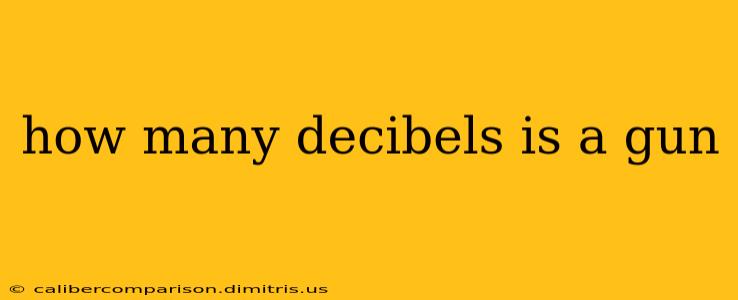How Loud is a Gunshot? Decibel Levels and Hearing Protection
The sound of a gunshot is incredibly loud, far exceeding levels that are safe for human hearing. But the exact decibel level isn't a single number; it varies significantly depending on several factors. Understanding these factors and the potential dangers is crucial for anyone who handles firearms or is exposed to gunfire.
Factors Affecting Gunshot Decibel Levels
Several factors influence the decibel level of a gunshot:
-
Type of Firearm: The caliber of the firearm, the type of ammunition used (e.g., pistol vs. rifle, different bullet weights and types), and the firearm's design all contribute to the sound's intensity. A small-caliber pistol will produce a lower decibel level than a high-powered rifle.
-
Distance from the Muzzle: The closer you are to the gun's muzzle when it fires, the louder the sound will be. The decibel level decreases significantly with distance. This is due to the inverse square law, which states that sound intensity decreases proportionally to the square of the distance.
-
Surrounding Environment: The environment in which the firearm is discharged also impacts the perceived loudness. Open spaces allow sound waves to dissipate more readily than enclosed spaces, where sound can reverberate and increase the overall decibel level.
-
Hearing Protection Used: Electronic muffs or earplugs significantly reduce the decibel level reaching the eardrum. Proper hearing protection is essential to mitigate the risk of hearing damage.
Typical Decibel Ranges of Gunshots
While precise figures are hard to give without specifying all the variables above, gunshot decibel levels generally range from 140 to 175 dB. To put this into perspective:
- 140 dB: This is comparable to a jet engine at takeoff. Exposure at this level for even a short period can cause permanent hearing damage.
- 175 dB: This is approaching the threshold of pain. Prolonged exposure at this level is extremely dangerous and can lead to immediate and severe hearing loss.
The Dangers of Gunshot Noise
Exposure to the intense noise of gunshots can lead to several hearing problems, including:
- Temporary Threshold Shift (TTS): A temporary reduction in hearing sensitivity that usually recovers after a period of rest.
- Permanent Threshold Shift (PTS): Irreversible hearing loss resulting from damage to the delicate hair cells in the inner ear. This is a serious condition that can severely impact quality of life.
- Tinnitus: A persistent ringing, buzzing, or hissing sound in the ears.
- Hyperacusis: Increased sensitivity to everyday sounds.
Protecting Your Hearing
Protecting your hearing around firearms is paramount. Always use appropriate hearing protection, such as:
- Hearing Protection Rated for Firearms: Look for electronic muffs or earplugs specifically designed to protect against high-decibel sounds like gunshots. These offer superior protection compared to standard earplugs.
- Multiple Layers of Protection: Combining earplugs and earmuffs provides the best protection.
Conclusion: The loudness of a gunshot is extremely high and poses a significant risk to hearing. Understanding the factors influencing the decibel level and consistently employing proper hearing protection is crucial for anyone who handles firearms or is around them. Prioritizing hearing health is essential to preventing long-term hearing damage and ensuring a better quality of life.

